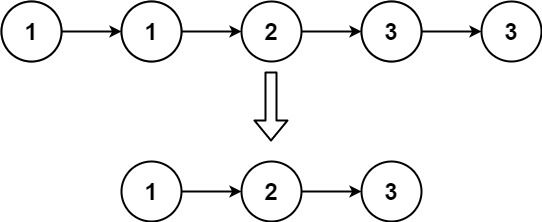Given the head of a sorted linked list, delete all duplicates such that each element appears only once. Return the linked list sorted as well.
Example 1:
Input: head = [1,1,2] Output: [1,2]
Example 2:
Input: head = [1,1,2,3,3] Output: [1,2,3]
Constraints:
- The number of nodes in the list is in the range
[0, 300]. -100 <= Node.val <= 100- The list is guaranteed to be sorted in ascending order.
# Definition for singly-linked list.
# class ListNode:
# def __init__(self, val=0, next=None):
# self.val = val
# self.next = next
class Solution:
def deleteDuplicates(self, head: ListNode) -> ListNode:
cur = head
while cur and cur.next:
if cur.val == cur.next.val:
cur.next = cur.next.next
else:
cur = cur.next
return head/**
* Definition for singly-linked list.
* public class ListNode {
* int val;
* ListNode next;
* ListNode() {}
* ListNode(int val) { this.val = val; }
* ListNode(int val, ListNode next) { this.val = val; this.next = next; }
* }
*/
class Solution {
public ListNode deleteDuplicates(ListNode head) {
ListNode cur = head;
while (cur != null && cur.next != null) {
if (cur.val == cur.next.val) {
cur.next = cur.next.next;
} else {
cur = cur.next;
}
}
return head;
}
}/**
* Definition for singly-linked list.
* struct ListNode {
* int val;
* ListNode *next;
* ListNode() : val(0), next(nullptr) {}
* ListNode(int x) : val(x), next(nullptr) {}
* ListNode(int x, ListNode *next) : val(x), next(next) {}
* };
*/
class Solution {
public:
ListNode* deleteDuplicates(ListNode* head) {
ListNode* cur = head;
while (cur != nullptr && cur->next != nullptr) {
if (cur->val == cur->next->val) {
cur->next = cur->next->next;
} else {
cur = cur->next;
}
}
return head;
}
};func deleteDuplicates(head *ListNode) *ListNode {
current := head
for current != nil && current.Next != nil {
if current.Val == current.Next.Val {
current.Next = current.Next.Next
} else {
current = current.Next
}
}
return head
}

